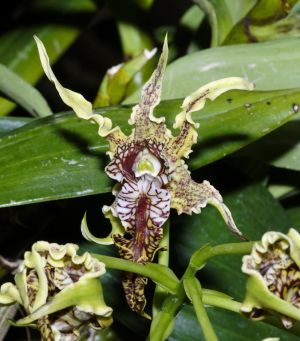(Created page with 'thumb|Dendrobium spectabile (not my photo) '''Common Name:''' The Grand Dendrobium<br /> '''Scented:''' no<br /> '''Light Requirements:''' par…') |
No edit summary Tag: wikieditor |
||
| (3 intermediate revisions by the same user not shown) | |||
| Line 1: | Line 1: | ||
[[File:Dendrobium_spectabile.jpg|thumb|Dendrobium spectabile (not my photo)]] | [[File:Dendrobium_spectabile.jpg|thumb|''Dendrobium spectabile'' (not my photo)]] | ||
'''Code:''' DEN.0x0003 | |||
'''Common Name:''' The Grand Dendrobium<br /> | '''Common Name:''' The Grand Dendrobium<br /> | ||
| Line 7: | Line 9: | ||
'''Blooms:''' winter to early spring<br /> | '''Blooms:''' winter to early spring<br /> | ||
'''Flower Size:''' to 7.5cm<br /> | '''Flower Size:''' to 7.5cm<br /> | ||
'''Synonyms:''' | '''Synonyms:''' ''Callista spectabilis'' (Blume) Kuntze 1891; ''Dendrobium tigrinum'' Rolfe ex Hemsl. 1891; *''Latourea spectabilis'' Blume 1849; ''Latouria spectabilis'' Blume 1850; ''Latourorchis spectabile'' [Bl.] Breiger 1981; ''Sayeria spectabilis'' (Blume) Rauschert 1983 | ||
A spectacular, medium to large sized, hot growing epiphyte in primary rain forests, mangrove swamps and moss forests as well as an occasional lithophyte on rocks from Papua New Guinea and the Solomon Islands at elevations of 300 to 2000 metres although it is most often from 300 to 500 metres with semi-globose at the base, to 8 noded stems carrying to 5, towards the apex, lanceolate to ovate, coriaceous, obtuse leaves, that blooms in the winter and early spring on an axillary, 20 to 40cm long, few to many flowered (to 20) raceme with minute, oblong bracts that arises from near the apex of leafed mature canes. Fertilizer as well as water should be reduced through the winter months and resumed only after the onset of new growth in the spring. | |||
- | |||
Latest revision as of 16:13, 11 June 2024

Code: DEN.0x0003
Common Name: The Grand Dendrobium
Scented: no
Light Requirements: partial sun
Temperature Requirements: hot
Blooms: winter to early spring
Flower Size: to 7.5cm
Synonyms: Callista spectabilis (Blume) Kuntze 1891; Dendrobium tigrinum Rolfe ex Hemsl. 1891; *Latourea spectabilis Blume 1849; Latouria spectabilis Blume 1850; Latourorchis spectabile [Bl.] Breiger 1981; Sayeria spectabilis (Blume) Rauschert 1983
A spectacular, medium to large sized, hot growing epiphyte in primary rain forests, mangrove swamps and moss forests as well as an occasional lithophyte on rocks from Papua New Guinea and the Solomon Islands at elevations of 300 to 2000 metres although it is most often from 300 to 500 metres with semi-globose at the base, to 8 noded stems carrying to 5, towards the apex, lanceolate to ovate, coriaceous, obtuse leaves, that blooms in the winter and early spring on an axillary, 20 to 40cm long, few to many flowered (to 20) raceme with minute, oblong bracts that arises from near the apex of leafed mature canes. Fertilizer as well as water should be reduced through the winter months and resumed only after the onset of new growth in the spring.